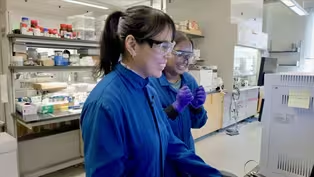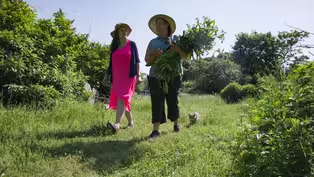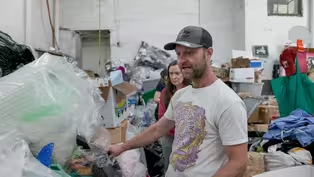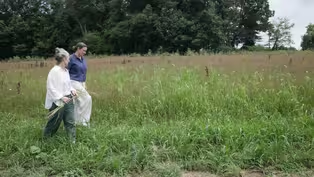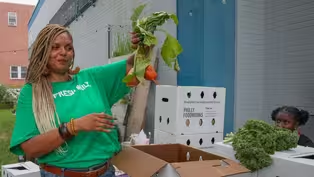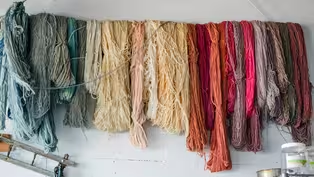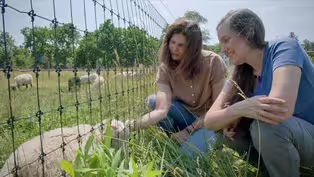WHYY Series
Growing bananas in Philly? Preparing for a warming future
Special | 1m 57sVideo has Closed Captions
As the climate changes so do our growing seasons.
As the climate changes so do our growing seasons. That means traditional plants that are now common in the Philadelphia region, like lilacs or some apples and plums, may no longer produce blossoms and fruit. At a cemetery in West Philadelphia, we visit with a group of people who are working to figure out what will thrive in a warmer climate — and take a peek into the fruits of the future.
Problems playing video? | Closed Captioning Feedback
Problems playing video? | Closed Captioning Feedback
WHYY Series is a local public television program presented by WHYY
WHYY Series
Growing bananas in Philly? Preparing for a warming future
Special | 1m 57sVideo has Closed Captions
As the climate changes so do our growing seasons. That means traditional plants that are now common in the Philadelphia region, like lilacs or some apples and plums, may no longer produce blossoms and fruit. At a cemetery in West Philadelphia, we visit with a group of people who are working to figure out what will thrive in a warmer climate — and take a peek into the fruits of the future.
Problems playing video? | Closed Captioning Feedback
How to Watch WHYY Series
WHYY Series is available to stream on pbs.org and the free PBS App, available on iPhone, Apple TV, Android TV, Android smartphones, Amazon Fire TV, Amazon Fire Tablet, Roku, Samsung Smart TV, and Vizio.
Providing Support for PBS.org
Learn Moreabout PBS online sponsorshipMore from This Collection
In this video series, WHYY’s Senior Climate Reporter Susan Phillips profiles innovative people working locally to cool the earth, heal the planet and help neighbors thrive.
Using chemistry to recycle clothes
Video has Closed Captions
Less than one percent of our clothes get recycled. (1m 32s)
The simple act of planting native species
Video has Closed Captions
Jennie Love shows us the benefits of native plants at her flower farm in Northwest Philadelphia (1m 58s)
Video has Closed Captions
By re-using raw materials, we keep trash out of the landfill. (1m 35s)
How flax can slow down fashion
Video has Closed Captions
Fields of flax with their tiny blue flowers once thrived in rural Pennsylvania. (1m 57s)
How a plant-based diet can help the planet
Video has Closed Captions
Eat your vegetables! It’s a common refrain. (1m 43s)
Video has Closed Captions
Synthetic dyes pollute waterways across the globe. Many are petroleum based and their production hel (1m 32s)
A climate solution that keeps us warm and dry
Video has Closed Captions
Industrial farms damage waterways and contribute to climate change. (1m 34s)
Providing Support for PBS.org
Learn Moreabout PBS online sponsorshipCould the future mean bananas growing in Philadelphia?
as the region warms up from human-caused climate change certain crops that are more traditional like certain apples or plums just won't survives because the winters won't be cold enough but here behind a West Philadelphia cemetery a group of people are working to prepare us for a hotter climate by experimenting with fruits trees that could thrive in a warmer future some of our really early fruiting crops like Asian plums and apricots for example sort of more northerly crops apples and pears and things like that increasingly they break dormancy early they bloom early and then they get hit by a frost and then they get hit by a frost and so the crop is lost the idea is to grow plants that are not quite viable outdoors at least not yet we've got some interesting things like hardy citrus that behind you is an olive tree a Korean tea plant over here this is a loquat tree pineapple guava pomegranates what's one piece of advice you would give someone who is trying to help mitigate climate change number one piece of advice is to plant trees we like to talk about the double carbon impact of urban orchards so fruit trees like any other trees are absorbing atmospheric carbon but at the same time all the food we produce in the city is food that doesn't have to be produced elsewhere the Philly Orchard Project has planted more than 1500 trees in vacant lots schoolyards and community gardens across the city those trees have produced more than 12000 lbs of fruit last year and in the future those fruits could include things like kumquats pomegranates olives and even bananas

- News and Public Affairs

Top journalists deliver compelling original analysis of the hour's headlines.

- News and Public Affairs

FRONTLINE is investigative journalism that questions, explains and changes our world.












Support for PBS provided by:
WHYY Series is a local public television program presented by WHYY
